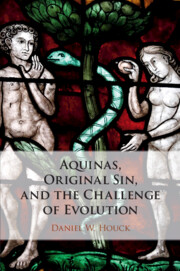Book contents
- Aquinas, Original Sin, and the Challenge of Evolution
- Aquinas, Original Sin, and the Challenge of Evolution
- Copyright page
- Dedication
- Contents
- Acknowledgments
- Introduction
- 1 Augustine and the Long Twelfth Century
- 2 Aquinas on Original Justice
- 3 Aquinas on the Effects of Original Sin
- 4 Aquinas on Original Guilt
- 5 Original Sin and Some Modern Theologians
- 6 Original Sin and the Challenge of Evolution
- 7 Original Sin
- 8 A Response to Some Objections
- Conclusion
- Select Bibliography
- Index
Introduction
Published online by Cambridge University Press: 22 February 2020
- Aquinas, Original Sin, and the Challenge of Evolution
- Aquinas, Original Sin, and the Challenge of Evolution
- Copyright page
- Dedication
- Contents
- Acknowledgments
- Introduction
- 1 Augustine and the Long Twelfth Century
- 2 Aquinas on Original Justice
- 3 Aquinas on the Effects of Original Sin
- 4 Aquinas on Original Guilt
- 5 Original Sin and Some Modern Theologians
- 6 Original Sin and the Challenge of Evolution
- 7 Original Sin
- 8 A Response to Some Objections
- Conclusion
- Select Bibliography
- Index
Summary
What gave rise to this superstition? Who taught Tess that children who die unbaptized are damned? Surely no reasonable religion would teach that children are condemned simply because they weren’t sprinkled with water. If we had put this objection to Tess or her priest, however, a response would have been ready to hand: “in every person born into this world, it deserveth God’s wrath and damnation.”2 The Church teaches that every child deserves damnation. Innocent in the eyes of the world, Sorrow was guilty in the eyes of God: he had contracted “original sin” in his mother’s womb.
- Type
- Chapter
- Information
- Publisher: Cambridge University PressPrint publication year: 2020
- 1
- Cited by

